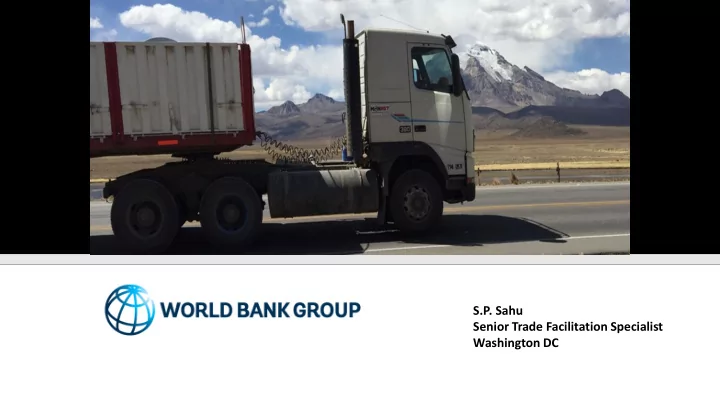

S.P. Sahu Senior Trade Facilitation Specialist Washington DC
WBG IS A MAJOR PROVIDER OF TRADE RELATED ASSISTANCE Analysis and Diagnostics Technical Assistance Financing of major trade infrastructure and institutional reform projects Research and data products (LPI/Doing Business) Global advocacy and partnerships The current portfolio is over $7 billion for trade facilitation projects. The World Bank Group has implemented more than 120 customs, border management and trade facilitation projects over the past 20 years that have resulted in major improvements in terms of reduced time to import and export, as well as better transparency, predictability, and reduced transaction costs for traders. Part of this is the WBG’s support to the WTO’s TFA agenda through the Trade Facilitation Support Program (TFSP)
TRADE FACILITATION LEADS TO BIG GLOBAL GAINS Adoption of e-documentation for Full implementation of TFA: air cargo: Benefits = US$12 billion annual savings US$110 billion US$ 210 billion/year through reduced paperwork Through reductions in time spent at customs related delays (70-80%) [Hillberry & Zhang 2015] [WEF, WB and Bain & Company 2013] Reduction of supply chain barriers: Reduction of If all countries reduce halfway to global best delay prior to shipment: practice (Singapore) + 1 day = - 1% trade = + 4.7% Global GDP (US$ 2.6 trillion) [Djankov, Freund, & Pham 2006] +14.5% World Trade (US$ 1.6 trillion) (WEF 2103)
Trade facilitation and logistics support Software Hardware Reengineering of systems and procedures, reduction of Trade-supporting infrastructure investments such as red tape, improvements in the competitiveness of roads, ports, cargo handling facilities, and ICT systems. transport and logistics markets, institutional development and coordination of trade-related agencies, and increasing the professionalism of logistics service providers. Maximize economic impact (e.g. complementing cross-border road projects with reforms to streamline border clearance processes) MTI projects directly cut trade costs and facilitate trade by: improving cooperation across border management agencies, harmonizing procedures, and fostering smoother and more cost-effective logistics.
Two overall program components • Provision of technical assistance to developing countries • reform of laws, procedures, processes, systems, and consultative mechanisms • Facilitation of knowledge sharing, peer-to-peer learning, and the measurement of progress and results.
REFORM IS NOT EASY… ▪ The import-export and transit process is complex ▪ The average trade transaction involves 20 – 30 different parties, 40 separate documents, and around 200 data elements (30 of which are repeated many times) ▪ Parties have different objectives, incentives, competencies, and constituencies ▪ The private sector, which is a critical component to success, is often not invited to consult and participate actively ▪ There may be limited political understanding of international trade and a lack of willingness to drive change in border agencies
GENDER INCLUSIVE TRADE PROGRAMS • Gender informed programs: greater incorporation of women led enterprises in consultative processes • Comprehensive firm level surveys at the firm level across program countries to examine key barriers faced by women in complying with import - export procedures ➢ to identify trade facilitation reforms that enable women to undertake trade… ➢ inform trade facilitation projects to address gender specific constraints
COMMON CHALLENGES TO ACHIEVING TFA IM IMPLEMENATION Prioritization Building consensus around reform priorities and amongst all relevant stakeholders Sequencing ▪ A general lack of awareness of processes and procedures amongst traders ▪ Mandatory documents and official fees and charges are often not published or made easily accessible ▪ Excessive manual processes and outdated legislation Technical ▪ Lack of an integrated ICT environment and Challenges inefficient logistics ▪ Lack of an integrated approach to risk Long delays at check points management for border clearance across border agencies ▪ Multiple checks of documents and duplication in data entry and recording
COMMON CH CHALLENGES CONT. ▪ Multiple interpretations of the TFA ▪ Lack of clear understanding of the legal implications of the TFA General ▪ Not all agencies are up to speed Understanding and Knowledge of ▪ Other Government Agencies (OGAs) not fully the TFA integrated into TFA agenda ▪ Advocacy work needs to be undertaken to ensure buy-in from all relevant stakeholders ▪ Establishment of Trade Facilitation Committees involving both the private and public sectors Fumigation with no alerts to traders can be difficult Planning ▪ Non- existent or weak NTFC’s Reforms ▪ Challenges exist with selecting activities requiring donor support vs. self- implementation
WBG is a major provider of trade related assistance • Analysis and diagnostics • Advisory services • Financing of trade infrastructure and institutional reform • Research and data products • Global advocacy and partnerships • More than 120 customs, border management and trade facilitation projects over last 20 years
WTO-TFA PREPARATION & IMPLEMENTATION SUPPORT TRADE FACILITATION SUPPORT PROGRAM (TFSP) Objective Assist developing countries in reforming and aligning their trade facilitation laws, procedures, processes & systems to enable implementation of the WTO TFA Requirements. Vision ❑ Implementation focused ❑ Rapid response capability ❑ Deep engagement with the private sector ❑ Strong monitoring, evaluation & results framework ❑ Complementary & sequenced Technical Assistance (TA) activity ❑ IFC-WB presence in most countries, project components included at national and regional levels ❑ Global expertise
TRADE FACILIATION SUPPORT PROGRAM (TFSP) • Assistance to 47 countries since inception in 2014: • Albania, Bangladesh, Bolivia, Bosnia and Herzegovina, Botswana, Burundi, Cambodia, Costa Rica, El Salvador, Eswatini, Ethiopia, Fiji, Georgia, Grenada, Guatemala, Honduras, Jamaica, Kazakhstan, Kosovo, Kyrgyz Republic, Lao PDR, Lebanon, Lesotho, Liberia, FYR Macedonia, Madagascar, Malawi, Moldova, Mongolia, Montenegro, Myanmar, Nepal, Nicaragua, Panama, Papua New Guinea, Samoa, São Tomé and Príncipe, Serbia, Sierra Leone, Sri Lanka, St. Lucia, Tajikistan, Timor- Leste, Togo, Vanuatu, Vietnam, and Zambia. Regional Breakdown: • 26% Africa • 23% Eastern and Central Europe IDA countries: 55% • 21% East Asia and the Pacific Fragile and conflict affected: 17% • 21% Latin America and the Caribe • 6% South Asia • 2% Middle East
Trade facilitation impact Subramanian, Uma, William Anderson, and Kihoon Lee. 2012. “Less Time, More Trade: Results from an Export Logistics Model.” Investment Climate Department, World Bank Group, Washington, DC
IMPLEMENTING IN PARTNERSHIPS
Recommend
More recommend